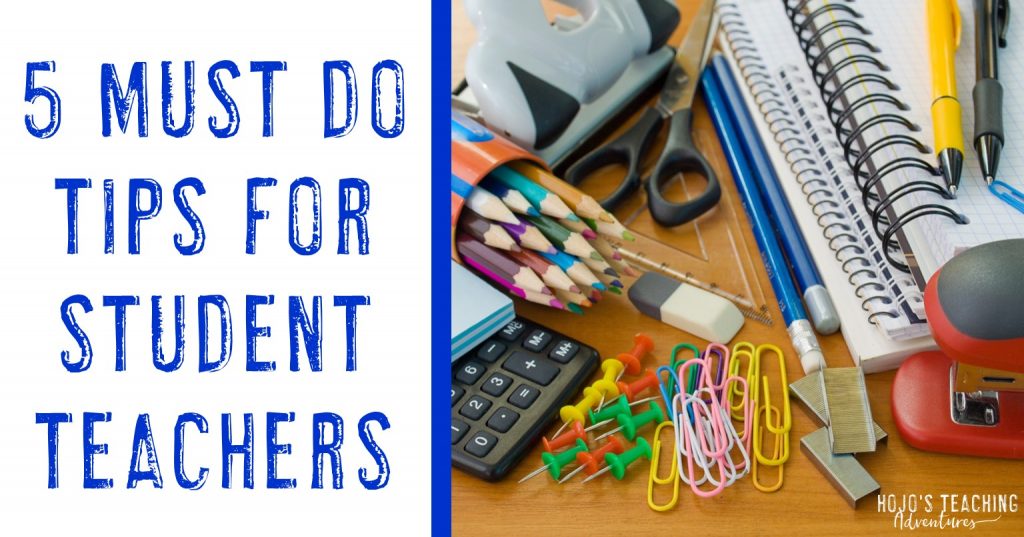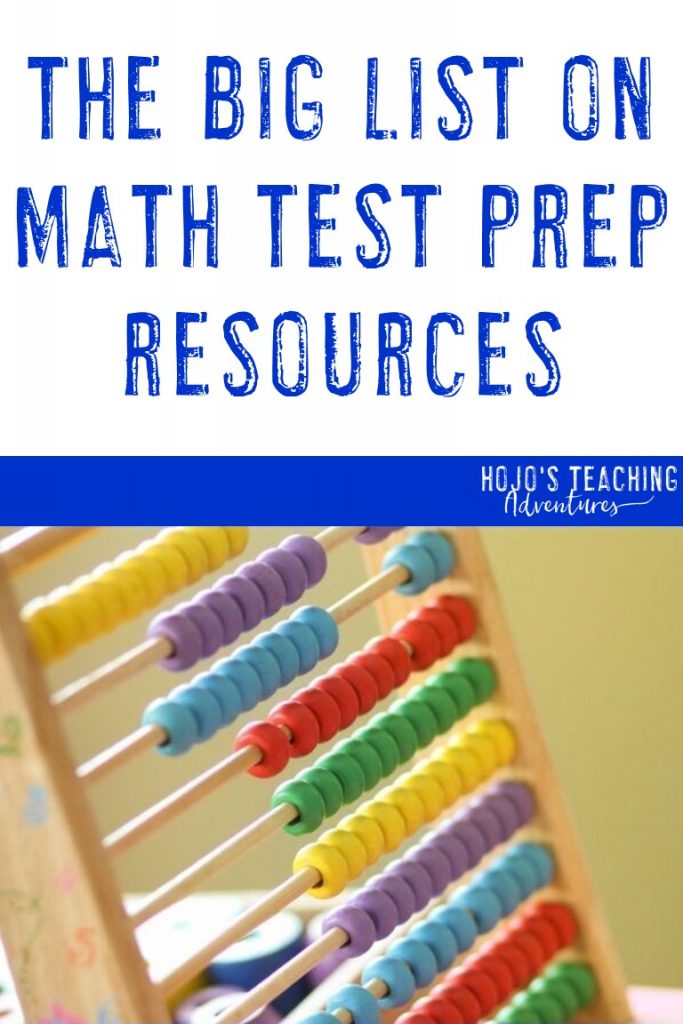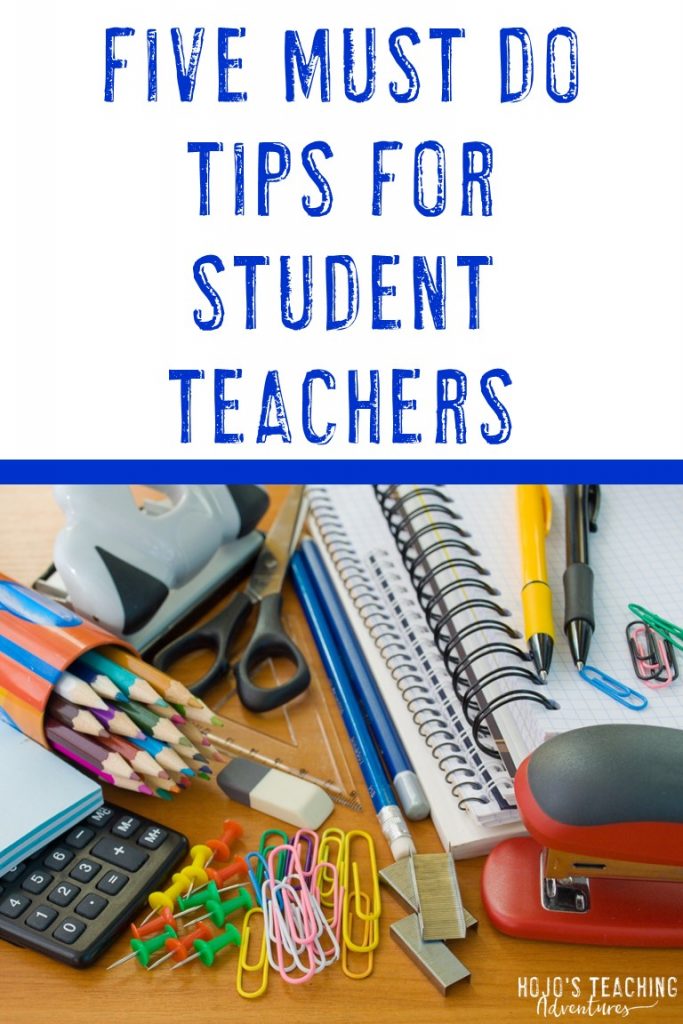Whether you call it student teaching, pre-service teaching, teaching practicum, or something else – you must read this blog post! Here I will share the tips, tricks, and ideas that I experienced in college that helped make me the teacher I am today.
1. ASK QUESTIONS! If you don’t read another word of this post, make sure to ask questions. Ask the principal if you can practice an interview with him/her. Ask your cooperating teacher how to start the year, what behavior plans s/he has used over the years, what to do during parent/teacher conferences, how to handle different types of drills, how s/he handles holidays and parties, and anything else you can think of! Ask your professors for their number one go to lesson. Ask your peers for their e-mails, Facebook, and cell numbers so you can bounce ideas off of them when that first year starts. There’s no such thing as a dumb question. It’s better to ask than be sitting in front of a room of 20+ students wondering why you didn’t…
2. Get as much experience as you can! There were teachers I graduated with who combined practice teaching assignments whenever possible. I, however, did just the opposite. Instead of putting in the 100+ hours for your Kindergarten endorsement while also student teaching, why not do the Kindergarten field experience the semester before you student teach? This allows you to experience two totally different classrooms, gain two totally different mentor teacher perspectives, and get that much more time in the classroom! The more experience you have as a new teacher, the better you will look to future principals and the more comfortable you will feel in front of the classroom.
I did my field experiences over the course of three years in college. These experiences ranged from preschool through 12th grade. I even spent a few hours at the local library and an after-school program. I was able to work with class sizes ranging from 4-26 students. Private schools, public schools, and charter schools were all a part of my experience. I was in regular education classrooms, inclusion classrooms, special education classrooms, elementary/middle/high school classes, and a classroom for students with severe physical and cognitive disabilities. Thankfully I had a great working relationship with the field experience director at my college. She knew I wanted to experience a wide range of classrooms, and she did everything she could to help me. However, I also called schools and asked them if I could come observe. While most of my visitations were set up by my university, I did a little of it on my own. It was worth the extra hassle to get more experience!
3. Look for jobs or volunteer positions that will prepare you for the teaching profession. Work as a preschool aide, help with daycare, teach at a local Sunday school program, or volunteer as a tutor. All of these positions will help you for your future teaching assignment. Some of them will even help you make money in the process. If you have an entire day or two free this week (some people can make that type of schedule work), try to substitute teach for a school district.
My first year in college I worked ten hours a week as a preschool aide. I gained a ton of valuable experience and received a small paycheck as a bonus. It was great to see the actual operations of a school from the inside. I wasn’t just coming in as a practice teacher for a few hours. I was there and I was treated as one of the staff. I was included in drills, pictures, specials, and everything else that goes on in a regular preschool classroom. On several occasions I was even allowed to sub when the teacher had to be gone. That truly proved to me that I was ready for whatever my future classroom might throw at me.
Look for jobs that will prepare you for college in unique ways. By far the best non-teaching position I had that most prepared me for my first year of teaching was becoming a Resident Assistant (RA) in my dorm. I was in charge of roughly 50 girls on my floor. These girls ran all over me during my first year. It was embarrassing to say the least, but I learned more about classroom management from that failed experience than any practice teaching assignments could have taught me. I realize that the whole “don’t smile until Christmas” thing had some truth in it. These girls knew they could walk all over me from the first moment, and they ran with it! The second year I knew how to start the year off right, and the entire year went ten times better! The same can be said for my classroom. Each year I front load my students and set clear expectations on the first few days of school. I’v run into very few problems.
4. Make connections with other educators. Have a list of people you can contact who will be able to help you out in a bind. You may not be lucky enough to have a great relationship with your coworkers during that first year, so have a professor or two you can call/e-mail/text for advice. Reach out to experienced teachers for ideas. If you don’t have anyone you’re comfortable asking for help, go to online forums such as ProTeacher, create an account, and ask for advice there.
It’s hard to tell where life will take you. I never dreamed I would start my teaching career on a Hutterite colony in the middle of South Dakota, but that’s exactly where I landed. There was very little support, and even less resources available there. Without the help of my resources from college, I’m not sure I would have been as successful. Here I am six years out of undergraduate and I still e-mail professors 2-3 times a year to ask their opinion or get materials from them. Every contact helps!
5. Use your resources wisely! The internet is such a valuable place to get lesson ideas. You don’t have to recreate everything and do this alone. You’ll want engaging activities while you student teach, and you’ll want even more of them when you get your own classroom. Find some teacher bloggers you enjoy following. Get on Pinterest. Check out Teachers Pay Teachers. Do a Google search. There’s a wealth of information out there. Use it!
Also take pictures of things you like in other classrooms. Start a website or file where you can save your ideas. Or post them on Pinterest so they’re all in one nice and neat spot.
~~~~~~~~~~~~~~~~~~~~~~~
Best of luck to you as you begin/continue this exciting time in your life. Teaching is truly one of the greatest professions out there. As you’ve probably heard, teaching makes all other professions possible. =)
I’d love to hear your thoughts or more advice in the comments section. Let’s get the dialogue going!
~HoJo~




Leave a Reply